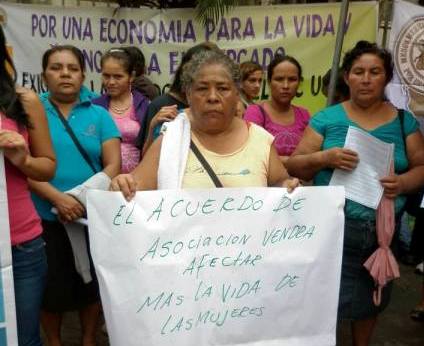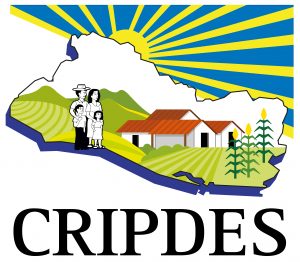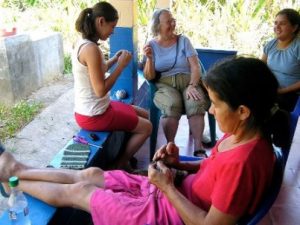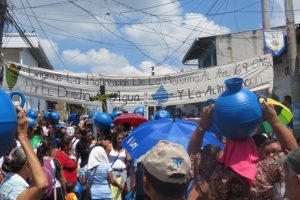Defending Natural Resources, Human Rights
On July 4th, Salvadoran Farmers Declare Independence from Food Imports, GMOs
On July 4th,the Movement of Popular Resistance (MPR-12) and Confederation of the Agrarian Reform (CONFRAS) held a rally and press conference in front the Salvadoran Legislative Assembly demanding the assembly pass a Food Sovereignty Law with a gender equality focus. The MPR-12 is a coalition conformed unions, organizations of farmers and poor urban folks and student organizations who have been working together to pass a Water Law, a Food Sovereignty Law and a Law to Ban Metallic Mining.
On the day of the rally, the Legislative Assembly approved a sweeping trade agreement between Central American and Europe called the ADA (the Agreement of Association with Europe). Environmental and social justice organizations oppose the bill because it contains regulations like those in CAFTA, that put national producers and farmers at a disadvantage while favoring foreign companies. The AdA would allow foreign powers to push for the privatization of state resources, make it harder for the government to freely make public policy and it would open the country to more lawsuits like the ones North American mining companies Pacific Rim and Commerce Group have filed for millions of dollars.
Unfortunately, while CRIPDES and the MPR-12 continue to push for laws that would benefit women, working Salvadorans and farmers, it seems the Salvadoran Legislative Assembly is on a different path. And because of the pressure of the pre-electoral season, with the right wing media taking every opportunity to criticize the FMLN, the party representing these sectors hasn’t been able to stand up against neoliberal laws like the AdA and the Public Private Partnership Law. For example, despite the resistance of the social movement the FMLN joined right wing parties in voting for AdA, for fear of being labeled anti-development by the mainstream media.
Read more about the social movements criticisms of the trade agreement here and here
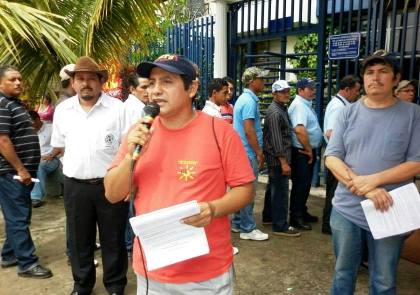
Press Release
On the International Day of the Cooperative: We demand a new legal framework for developing the agricultural cooperative sector starting with a new law of food sovereignty
The Salvadoran agricultural cooperative movement passed through its toughest test by surviving 20 years of neoliberal agrarian counter-reform, destruction of cooperatives and the promotion of an extremely individualistic way of life.With the change of government in June 2009, those of us in cooperatives which had survived the neoliberal period shifted from defending our land and our organization, to productive recuperation and economic recovery, with the goal of becoming the seed of a new economic model.
However, the productive and economic growth of agricultural cooperatives is not possible if we do not remove the legal obstacles inherited from our neoliberal past. Neo-liberalism destroyed the production of small farmers and our natural resources and favored the import and consumption of foreign goods. Now we need structural changes that promote agricultural production, help the environment recover, encourage the domestic market and garuntee the food sovereignty of everyone in our country.
The Significance of International Cooperative Day
The cooperative movement was born 169 years ago. In 1844, the first cooperative in the world was founded in the town of Rochdale, England. Since then the cooperative has been the path to freedom from capitalist exploitation and towards an equitable model of wealth created by workers.
As a result of the inhumane nature of capitalism, three types of organization were formed all over the world to fight the injustices of the capatalist system: unions, cooperatives and socialist parties. Trade unions and labor parties created their organizations in 1864 and 1889, respectively. And in 1895, the International Cooperative Alliance was born, an organization that currently has a billion affiliates worldwide.
In 1992 the United Nations decided that starting in 1995, the International Day of the Cooperative will be commemorated the first Saturday of July. Ten years later, the UN took another step on our behalf by proclaiming 2012 as International Year of the Cooperative.
The Salvadoran Cooperative
The first cooperative of our country was founded nearly a century ago, in 1914, by a group of shoemakers in San Salvador. But it was not until November, 1965 that the first Cooperative Association Act was enacted and two years later the first cooperative regulatory institution was created, the National Institute of Cooperatives (INSAFOCCOP).
With the Agrarian Reform Law of 1980 a boost was given to agricultural cooperatives. 23% of the country’s arable land (227, 543 hectares) was transferred to small farmers. However, what could be a tool of liberation of the peasant class was turned into a political weapon of counter-insurgency and of corruption used by the governments of those years.
What could not be destroyed or corrupted in the 80s, was attacked again in the 90s decrees harmful as the 747 (April 1991 repealed) and 719 (May 1996, in force), which we will call “counter land “. Until 2009, these decrees disappeared with 350 cooperatives (52.5%) of 666 cooperatives that were founded in the 80s.
It was the organization of cooperatives and the training of new leaders that prevented the total disintegration of the Agrarian Reform process. In 20 years of struggle against the right-wing ARENA governments, agricultural cooperatives gained experience defending their land and their organization, that’s why 316 cooperatives, nearly half of the original cooperatives, were saved from deadly anti-agrarian anti-cooperative policies of ARENA.
Despite the adverse conditions experienced until the 2009 change of government, Salvadoran cooperatives remains a sector with great social and economic importance. In total there are 2,146 active cooperatives, with 281,352 people participating.
The Agricultural Cooperatives of El Salvador Demand that the Legislative Assembly:
1. Adopt a Food Sovereignty Law which contains seven key principles:
a) The right of the Salvadoran people not only to food, but the right to grow their own food and to decide how to grow it. For this point, it is necessary to approve the constitutional reform that would declare the right to food as a human right.
b) The right of the family farm to land and water.
c) Financial support for small farmers as well as technical support and training; machinery, equipment and tools, infrastructure and systems of direct marketing.
d) The non-dependence on foreign agricultural inputs, especially chemicals and GMO seeds.
e) The explicit participation of rural women in terms of property, participation in the farming process, in the administration of what has been grown, in the distribution of benefits and in collective decision making.
f) The promotion of associations and/or cooperative organizations.
g) Protection of food grown and harvested in El Salvador instead of the promotion of unfair trade agreements that favor importation.
2. Repeal Decree 719, a law that is anti-agrarian reform and promotes breaking up land, selling off land and has the effect of destroying cooperative and denying the rights of women to join cooperatives.
3. Approve the reforms to the Cooperative Associations Act, proposed by the Alliance of Women Cooperatives of El Salvador, since this law needs to be updated to incorporate the rights of women and make sure that it falls in line with the newly passed “Law of Equality, Equality and Eradication of Discrimination Against Women” and the “Special Law for a Life Free of Violence Against Women”.
4. Approve the amendments to the Law on Plant and Animal Health, to ban the marketing and use of highly toxic agrochemicals that are banned in most countries.
5. Restore Article 30 of the Seeds Law, in order to reactivate the ban on the importation, marketing and use of GMO seeds and products.
-San Salvador, July 4th, 2013

